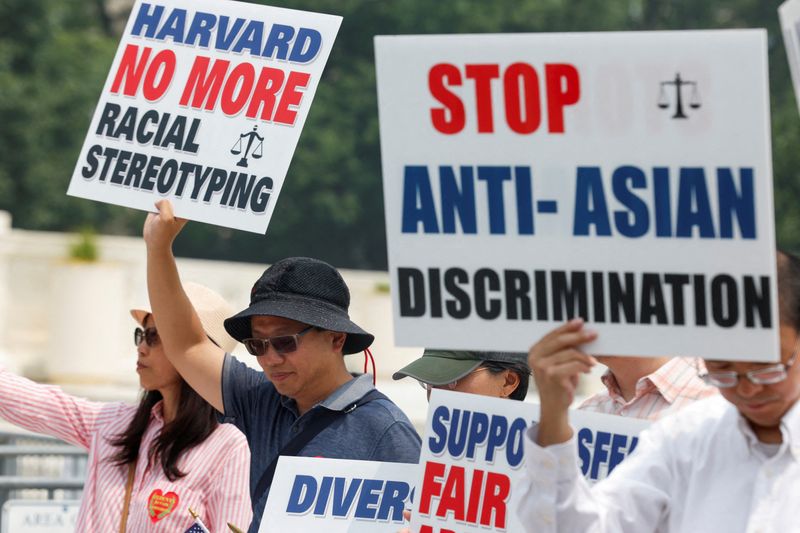By Joseph Ax
(Reuters) - A non-profit group opposing race-based education policies has filed more than a dozen U.S. civil rights complaints this year against universities, challenging the legality of offering minority scholarships, summer study and residency programs to promote racial diversity.
The challenges are part of a growing campaign against diversity initiatives after a U.S. Supreme Court landmark ruling in June outlawed use of race in college admissions, commonly known as affirmative action. Conservative activists say the decision should extend to all educational programs, and some groups have also challenged corporate diversity policies.
The Equal Protection Project of the Legal Insurrection Foundation, headed by Cornell University clinical law professor William Jacobson, filed the complaints with the U.S. Department of Education's civil rights office.
The latest complaint, filed last week, accused Western Kentucky University of violating civil rights law by offering two scholarships – one for undergraduate students and one for graduate students – available only to minority applicants. The university did not respond to a request for comment.
Other targets include a minority scholarship at Kansas State University and a residency program for Black filmmakers at the University of Nebraska-Lincoln.
In an interview, Jacobson said the education department has asked the group for more information but has not indicated whether it will launch formal investigations. A departmental spokesperson said the office for civil rights does not discuss details of its cases.
Jacobson said any program contingent on race is unlawful.
"The typical response is, well, what's wrong with wanting diversity?" he said. "There's nothing wrong with that. But you can't do it through racial discrimination, and the Supreme Court has been very clear about that."
Advocates say race-conscious programs are necessary to combat institutional and societal disadvantages facing minority students, particularly in light of the Supreme Court's decision. Black children are more likely to grow up in low-income households, with less access to high-quality child care and enrichment activities.
Top schools have warned that eliminating race as an admissions factor will result in fewer minority students.
"A student missing $1,000 or having a gap of $800 could mean the difference between being able to graduate or not," said Ameshia Cross, director of communications for the Education Trust, whose website says it works to "dismantle the racial and economic barriers embedded in the American education system."
Cross, who also works as a Democratic strategist, said she would not have been able to attend Belmont University, a private school, without the help of an annual $5,000 minority scholarship.
RESPONSE TO RULING
While the Supreme Court's ruling was limited to admissions, it prompted some schools to re-examine race-based programs.
The University of Missouri system announced it would eliminate race as a factor in awarding scholarships. The state's Republican attorney general sent a letter instructing all colleges in Missouri, including private schools, to adopt race-blind standards for admissions, scholarships, employment and other programs.
Other schools have vowed to pursue alternative avenues toward improving racial diversity, such as increasing recruiting from underprivileged schools.
Evan Caminker, a law professor at the University of Michigan, said it was not yet clear whether the Supreme Court decision would extend beyond admissions to race-conscious programs. He noted that the court emphasized the "zero-sum" nature of admissions - every successful applicant takes away a spot from other potential students.
By contrast, a school might award its scholarships in a race-neutral way, only to then decide which specific scholarships would be assigned to which students, he said.

The Department of Education's civil rights office is likely to be a frequent battleground. In July, the office confirmed it had opened an investigation into whether Harvard discriminates against minorities by favoring "legacy" applicants with ties to donors or alumni, following a complaint filed by civil rights groups.
On Tuesday, the organization that won the Supreme Court case, Students for Fair Admissions, filed a new lawsuit challenging affirmative action admission practices at the U.S. Military Academy at West Point. The Supreme Court had exempted military academies from its June decision, saying in a footnote that these schools might have "distinct" interests.